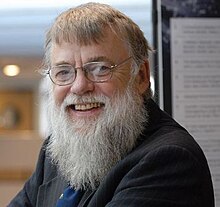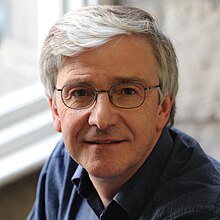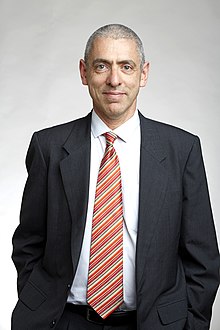 The Informatics Forum, home to the School of Informatics since 2008 The Informatics Forum, home to the School of Informatics since 2008 | |
| Established | 1998 (1998) |
|---|---|
| Parent institution | University of Edinburgh |
| Head of School | Helen Hastie |
| Academic staff | 370 |
| Administrative staff | 96 |
| Students | 1717 |
| Undergraduates | 1020 |
| Postgraduates | 697 |
| Location | Edinburgh, Scotland, UK |
| Website | www |
 | |
The School of Informatics is an academic unit of the University of Edinburgh, in Scotland, responsible for research, teaching, outreach and commercialisation in informatics. It was created in 1998 from the former department of artificial intelligence, the Centre for Cognitive Science and the department of computer science, along with the Artificial Intelligence Applications Institute (AIAI) and the Human Communication Research Centre.
Research in the School of Informatics draws on multiple disciplines. The school is particularly known for research in the areas of artificial intelligence, computational linguistics, systems biology, mathematical logic and theoretical computer science; but also contributes to many other areas of informatics.
The School of Informatics is ranked 20th in the world by the QS World University Rankings 2023. As of 2022, the school is ranked 1st in the UK according to CSRankings, 1st in the UK in the latest 2021 Research Excellence Framework (REF) by research power, and 1st in the world for natural language processing (NLP).
Research









The School of Informatics was awarded a 5*A in the UK HEFCE's 2001 RAE, the only computer science department in the country to achieve this highest possible rating. In the 2008 RAE, the School's "Quality Profile" was 35/50/15/0/0, which means that of the over 100 Full-time equivalent (FTE) staff research outputs evaluated, 35% were found "world-leading (4*)" and 50% "internationally excellent (3*)". These figures can be interpreted in a number of ways, but place the School first by volume and tied for second (following Cambridge with 45/45/10/0/0) by percentage of research rated 3* or 4*. The School is generally considered world-leading, standing with the foremost U.S. institutes, particularly in areas such as artificial intelligence, natural language processing and machine translation, and theoretical computer science.
The School has a number of research Institutes:
Institute for Adaptive and Neural Computation: ANC
ANC investigates theoretical and empirical study of brain processes and artificial learning systems, drawing on neuroscience, cognitive science, computer science, computational science, mathematics and statistics.
Artificial Intelligence and its Applications Institute: AIAI
Previously known as CISA (Centre for Intelligent Systems and their Applications), the Artificial Intelligence and its Applications Institute (AIAI) works on the foundations of artificial intelligence and autonomous systems, and their application to real-world problems.
Institute for Language, Cognition, and Computation: ILCC
ILCC performs research on all aspects of natural language processing, drawing on machine learning, statistical modeling, and computational, psychological, and linguistic theories of communication among humans and between humans and machines using text, speech and other modalities.
Institute for Computing Systems Architecture: ICSA
ICSA performs research on architecture and engineering of future computing systems: performance and scalability; innovative algorithms, architectures, compilers, languages and protocols.
Institute of Perception, Action and Behaviour: IPAB
IPAB links computational action, perception, representation, transformation and generation processes to real or virtual worlds: statistical machine learning, computer vision, mobile and humanoid robotics, motor control, graphics and visualization.
Laboratory for Foundations of Computer Science: LFCS
Main article: Laboratory for Foundations of Computer ScienceThe LFCS Develops and applies foundational understanding of computation and communication: formal models, mathematical theories, and software tools.
Senior academic staff and alumni
Current
Senior academic staff include:
- Malcolm Atkinson
- Alan Bundy
- Peter Buneman
- Christopher Bishop
- Rod Burstall, emeritus
- Kousha Etessami
- Wenfei Fan
- Michael Fourman
- Igor Goryanin
- Sharon Goldwater
- Dragan Gasevic
- Jane Hillston
- Aggelos Kiayias
- Elham Kashefi
- Frank Keller
- Mirella Lapata
- Alex Lascarides
- Leonid Libkin
- Fiona McNeill
- Ursula Martin
- Johanna Moore
- Michael O'Boyle
- Gordon Plotkin
- Don Sannella
- Mark Steedman
- Perdita Stevens
- Keith Stenning
- Amos Storkey
- Austin Tate
- Sethu Vijayakumar
- Philip Wadler
- Barbara Webb
- Bonnie Webber
Former
- Donald Michie, founder of Artificial Intelligence in the UK
- Sidney Michaelson foundation chair of the former computer science department.
- Jon Oberlander
Notable alumni
Alumni of the school of informatics include:
- Samson Abramsky, computer scientist at the University of Oxford
- Pat Ambler, creator of Freddy II
- Joe Armstrong, creator of Erlang programming language and Open Telecom Platform (OTP)
- Andrew Blake, computer scientist and former director of Microsoft Research, Cambridge and Alan Turing Institute in London
- Bob Boyer, computer scientist, mathematician, philosopher at the University of Texas at Austin
- Alan W. Black, professor at the Language Technologies Institute, Carnegie Mellon University
- Justine Cassell, professor at the Human–Computer Interaction Institute, Carnegie Mellon University
- Luca Cardelli, computer scientist, Assistant Director of Microsoft Research, Cambridge
- Ian Clarke, creator of Freenet
- Rosemary Candlin, crystallographer and computer scientist at CERN
- Margarita Chli, leader of the Vision for Robotics Lab at ETH Zürich
- John Darlington, emeritus professor, Imperial College London
- Bruce Davie, CTO of VMware
- Peter Dayan, director at the Max Planck Institute for Biological Cybernetics in Tübingen, Germany
- Paul Dourish FACM, professor at the University of California, Irvine
- Grigori Fursin, vice president of MLOps, president of the CTuning foundation
- Carla Gomes, computer scientist, founding director of the Cornell University Institute for Computational Sustainability
- Leslie Ann Goldberg, computer scientist at the University of Oxford
- Jeremy Gibbons, professor of computing, University of Oxford
- Andrew Gordon at Microsoft Research
- Michael J. C. Gordon (1948–2017), computer scientist at the University of Cambridge
- Doug Gurr, global vice-president and head of Amazon UK
- Alex Graves, computer scientist at Google DeepMind
- Philippa Gardner, professor of theoretical computer science at Imperial College London
- Richard Gregory (1923–2010), cognitive scientist at the University of Bristol
- Pat Hayes, senior research scientist at the Institute for Human and Machine Cognition in Pensacola, Florida
- Robert Harper (computer scientist), professor of computer science at Carnegie Mellon University
- Matthew Hennessy, co-creator of Hennessy–Milner logic
- Geoffrey Hinton, computer scientist at Google Brain and winner of the Turing Award.
- Xuedong Huang, CTO of Microsoft Azure AI
- Auke Ijspeert, head of the biorobotics laboratory at EPFL
- Mark H. Johnson, cognitive neuroscientist and Brain–computer interface researcher, head of the department of psychology at the University of Cambridge
- Mark Jerrum, professor of pure mathematics at the University of London, Gödel Prize Laureate
- Philipp Koehn, professor of machine translation at Johns Hopkins University
- Robert Kowalski, logician whose interpretation of the Horn clause at Edinburgh became instrumental in the creation of Prolog
- Lǐ Wèi, mathematician and computer scientist, President of Beihang University
- Christopher Longuet-Higgins (1923–2004), cognitive scientist
- Robin Milner FRS FRSE (1934–2010), computer scientist, winner of the Turing Award
- Eugenio Moggi, first to explicitly link the Monad of category theory to functional programming
- J Strother Moore, computer scientist at the University of Texas at Austin
- Stephen Muggleton, Head of the Computational Bioinformatics Laboratory at Imperial College London
- Alan Mycroft, professor at the Computer Laboratory, University of Cambridge
- Timothy O'Shea, emeritus professor and former principal and vice-chancellor of the University of Edinburgh
- Robin Popplestone (1938–2004), creator of COWSEL and POP-2
- Martha Palmer, creator of PropBank and VerbNet
- Benjamin C. Pierce, Henry Salvatori Professor of computer science at the University of Pennsylvania
- Lars Rasmussen (Software Developer), co-founder of Google Maps, former director of engineering (CTO) of Facebook London.
- John C. Reynolds (1935–2013), inventor of System F and professor of computer science at Carnegie Mellon University
- Davide Sangiorgi, professor at the University of Bologna
- Sue Sentance, director of the Raspberry Pi Foundation Computing Education Research Centre, University of Cambridge
- Nigel Shadbolt, Chairman of the Open Data Institute (ODI) and master of Jesus College, Oxford
- Alistair Sinclair, professor at University of California, Berkeley, Gödel Prize Laureate
- Aaron Sloman, philosopher, cognitive scientist at the University of Birmingham
- Chris Tofts, scientist at Hewlett-Packard
- Stephen Tweedie, creator of ext3
- Mads Tofte, professor at the IT University of Copenhagen
- Michael Uschold, research scientist at Boeing Phantom Works
- Leslie Valiant, winner of the Turing Award in 2010 and professor at Harvard University
- Lincoln Wallen, CTO of Improbable, former CTO of DreamWorks Animation
- Toby Walsh, professor of artificial intelligence at the UNSW
- Hanna Wallach at Microsoft Research
- David H. D. Warren, creator of the Warren Abstract Machine
- Andrew Zisserman, computer scientist at Google DeepMind and University of Oxford
Accommodation
The 2002 Cowgate fire destroyed a number of buildings, including 80 South Bridge, which housed around a quarter of the school and its renowned AI library. By January 2003, space was made available in the University's Appleton Tower as a replacement.
Until June 2008, the School was dispersed over five sites: three in the George Square Campus: Appleton Tower, Buccleuch Place, Forrest Hill; and two at King's Buildings: James Clerk Maxwell Building, and the Darwin Building.
In June and July 2008, the School's research moved into its new home, the Informatics Forum. The building, designed by Bennetts Associates, Reaich and Hall and Buro Happold, now houses some 500 researchers, including staff and graduate students. Construction began in October 2005, and the Forum's completion in July 2008 finally brought the School's researchers together, under one roof, some ten years after its inception.
In August 2018, the School gained another research space in the form of the Bayes Centre, a purpose-built data science and Artificial Intelligence hub shared with multiple other data science and informatics groups, as well as the University's Maxwell Graduate Institute, encompassing the PhD research output of the mathematics departments at both Edinburgh and Heriot-Watt University.
See also
- Edinburgh Parallel Computing Centre
- ML
- Prolog
- WxWidgets
- Moses
- Hope
- NPL
- Freddy II
- Festival Speech Synthesis System
- LCF
- Edinburgh Multiple Access System
- Edinburgh IMP
- QCDOC
- Symbolic artificial intelligence
- Lighthill report
References
- "Contact us". University of Edinburgh School of Informatics. 11 September 2018. Retrieved 11 September 2018.
- ^ "Staff Headcount & Full Time Equivalent Statistics (FTE) as at Oct 17". Human Resources, The University of Edinburgh. October 2018. Retrieved 9 May 2018.
- ^ "University of Edinburgh Factsheet 2017/2018" (PDF). Governance & Strategic Planning, The University of Edinburgh. 31 January 2018. Retrieved 9 May 2018.
- Berger, Emery D. (2020). "CSRankings".
- "Research rankings confirm Edinburgh as world leader". The University of Edinburgh. Retrieved 15 May 2022.
- Berger, Emery D. (2020). "CSRankings".
- Dayan, Peter Samuel (1991). Reinforcing connectionism: learning the statistical way. lib.ed.ac.uk (PhD thesis). hdl:1842/14754. EThOS uk.bl.ethos.649240.

- ^ "RAE 2001 : Results". rae.ac.uk.
- "RAE 2008 : Quality profiles". rae.ac.uk.
- "Informatics News: RAE 2008 results: Informatics and Computer Science".
- "Welcome — ANC - Institute for Adaptive and Neural Computation". www.anc.ed.ac.uk.
- "CISA is changing its name | InfWeb". web.inf.ed.ac.uk. Retrieved 30 March 2021.
- "AIAI - InfWeb". web.inf.ed.ac.uk.
- "ILCC - InfWeb". web.inf.ed.ac.uk.
- "ICSA - InfWeb". web.inf.ed.ac.uk.
- "IPAB - InfWeb". web.inf.ed.ac.uk.
- "Welcome to LFCS — LFCS". wcms.inf.ed.ac.uk.
- "People". The University of Edinburgh.
- Hinton, Geoffrey Everest (1977). Relaxation and its role in vision. lib.ed.ac.uk (PhD thesis). University of Edinburgh. hdl:1842/8121. OCLC 18656113. EThOS uk.bl.ethos.482889.

- Anon (2014). "Shadbolt, Prof. Nigel Richard". Who's Who (online edition via Oxford University Press ed.). A & C Black. doi:10.1093/ww/9780199540884.013.U245873. (Subscription or UK public library membership required.)
- Seenan, Gerard (9 December 2002). "Fire devastates Edinburgh's Old Town". the Guardian. Retrieved 30 March 2021.
- agencies, Staff and (9 December 2002). "Edinburgh AI archive lost in fire". the Guardian. Retrieved 30 March 2021.
- Fourman, Michael Paul. "Emergency Arrangements". www.inf.ed.ac.uk. Retrieved 30 March 2021.
- "Groups within Bayes Centre".
| University of Edinburgh | ||
|---|---|---|
| Governance |  | |
| History | ||
| People | ||
| Academic divisions |
| |
| Places |
| |
| Student life | ||
| Associated | ||
55°56′40″N 3°11′14″W / 55.94444°N 3.18722°W / 55.94444; -3.18722
Categories: